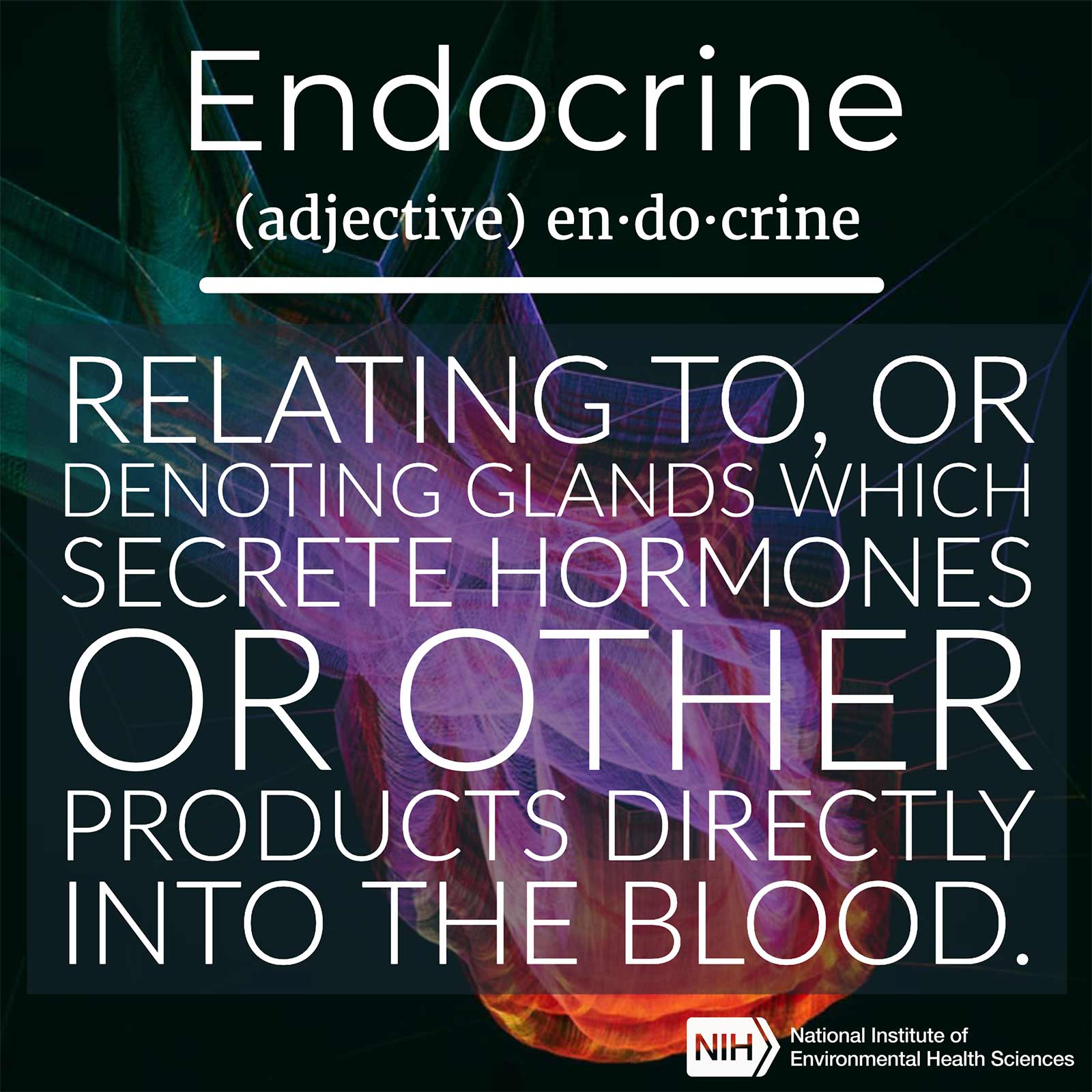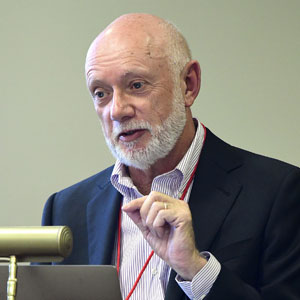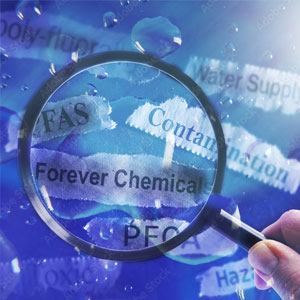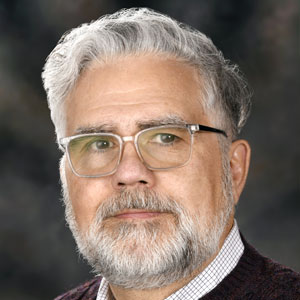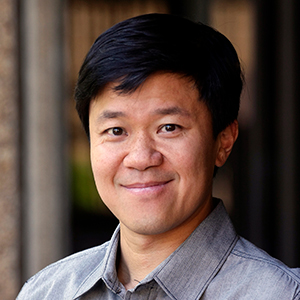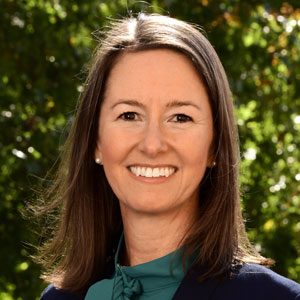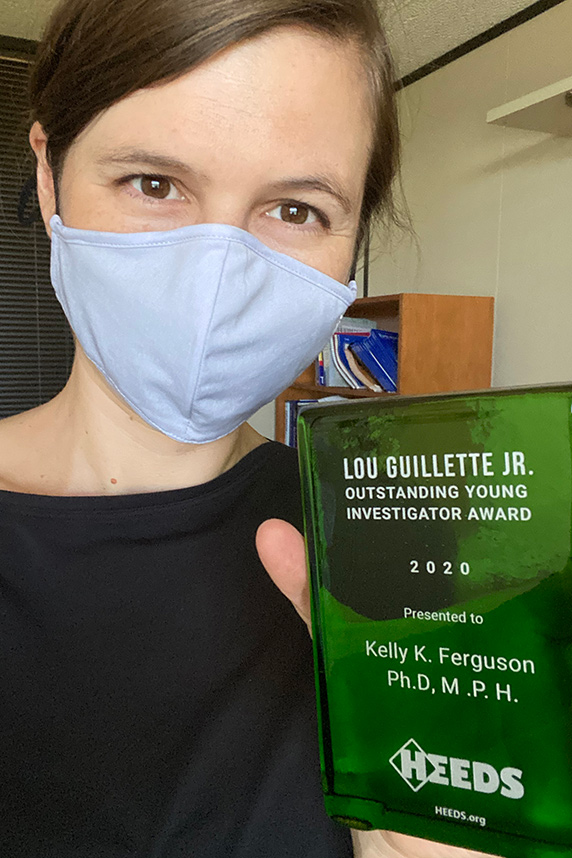 Ferguson, shown with the Guillette award, focuses some of her research on determining biochemical markers of oxidative stress in the body. (Photo courtesy of Kelly Ferguson)
Ferguson, shown with the Guillette award, focuses some of her research on determining biochemical markers of oxidative stress in the body. (Photo courtesy of Kelly Ferguson)Healthy Environment and Endocrine Disruptor Strategies (HEEDS) named Kelly Ferguson, Ph.D., the winner of the inaugural Lou Guillette Jr. Outstanding Young Investigator Award. HEEDS is a nonprofit that integrates and promotes scientific developments in the study of chemicals that disturb the endocrine system, or EDCs.
Ferguson, head of the NIEHS Perinatal & Early Life Epidemiology Group, learned of the award in September. “Lou Guillette is such an icon in environmental health,” she said. “When I was a Ph.D. student, he stopped by my poster on phthalates and thyroid hormones at a Superfund Research Program meeting. I am really proud to be recognized now as an independent investigator with an award in his name.”
“I am thrilled but not surprised that Kelly was recognized with this award,” said Dale Sandler, Ph.D., head of the NIEHS Epidemiology Branch. “Her enthusiasm for research and mentoring have been apparent since she joined the Epidemiology Branch as a tenure track researcher in 2016. Her mechanistic approach to the study of potential reproductive effects of chemicals from consumer products makes her the ideal recipient of the Lou Guillette Jr. award.”
Research plus mentoring
According to the HEEDS award letter, the award honors Lou Guillette Jr., by recognizing an early career scientist who is creative, dedicated, and successful, with leadership qualities and a special love of and dedication to mentoring.
“Dr. Ferguson, your scientific record of achievement and your dedication to mentoring make you an ideal person to receive this new but prestigious award,” wrote HEEDS coordinators Sarah Howard and Jerry Heindel, Ph.D. Heindel is a former NIEHS health scientist administrator.
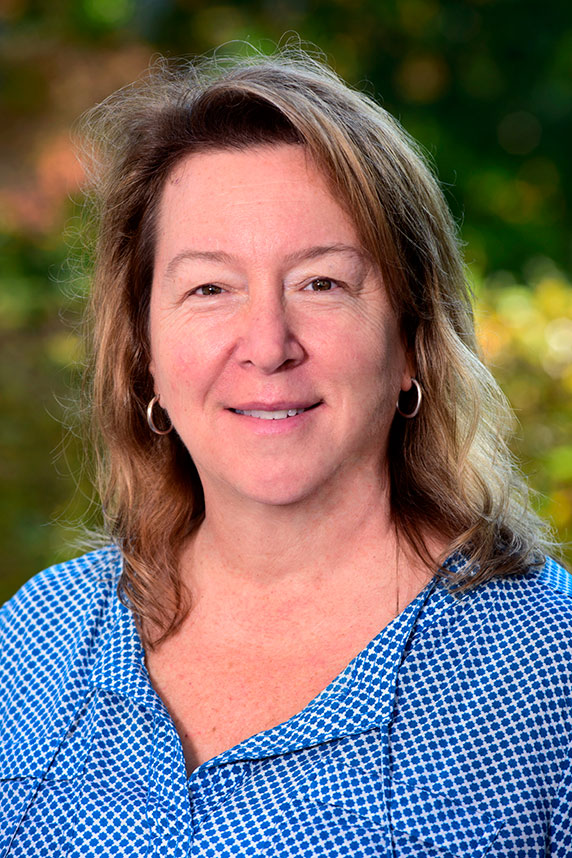 Fenton, who heads the Reproductive Endocrinology Group, was named Outstanding Mentor by National Institutes of Health graduate student trainees earlier this year. (Photo courtesy of Steve McCaw / NIEHS)
Fenton, who heads the Reproductive Endocrinology Group, was named Outstanding Mentor by National Institutes of Health graduate student trainees earlier this year. (Photo courtesy of Steve McCaw / NIEHS)Studying mixtures of toxicants
In her nomination letter, NIEHS toxicologist Sue Fenton, Ph.D., noted Ferguson’s study of exposure effects from mixtures of chemicals. “Those of us conducting EDC research know that one chemical may not be the whole answer in environment-based disease,” Fenton wrote. “Mixtures are where we need to be moving.”
Guillette was a toxicologist. Ferguson said she thinks carefully about toxicants in her work and has had toxicologists as mentors. “Even so, it’s nice to be recognized as an epidemiologist,” she said. “It’s important to recognize research across different disciplines.”
Ferguson combines lab-based and epidemiological analyses to look for links between consumer product exposures during pregnancy and fetal growth outcomes. “Because of her demonstrated leadership, she has been able to acquire data from some of the largest and most well-funded birth cohorts in the country to expand her datasets,” Fenton wrote.
Ferguson also searches for biochemical markers, or biomarkers, of exposure effects. Biomarkers might lead to interventions to prevent or reduce low birthweight, premature birth, and other poor birth outcomes.
Mentoring above and beyond
Another nominator, postdoctoral fellow Barrett Welch, Ph.D., highlighted Ferguson’s individualized mentoring. The small- to medium-sized universities where he trained were not closely connected to more prominent institutions and scientists in environmental epidemiology.
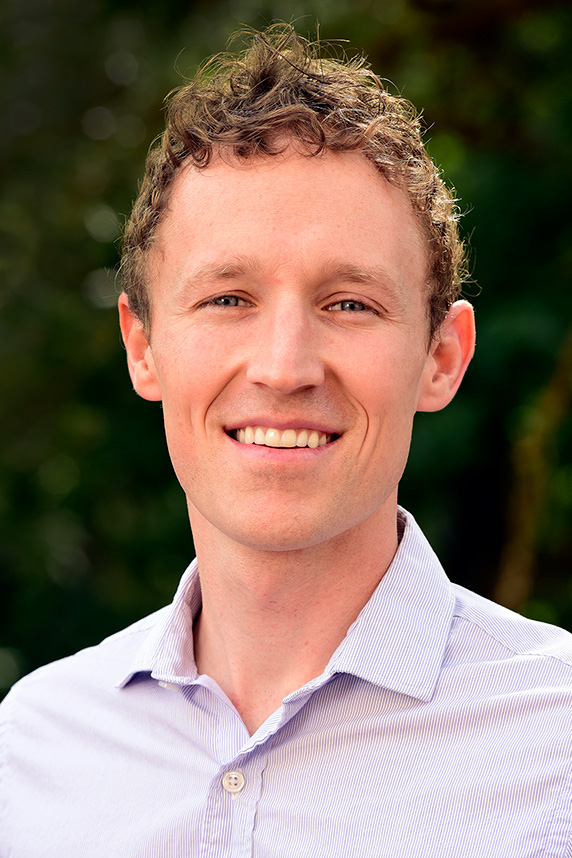 In July, Welch won a National Institutes of Health Fellows’ Award for Research Excellence. His October NIEHS Paper of the Month was further selected by the Division of Intramural Research as a 2020 Paper of the Year. (Photo courtesy of Steve McCaw / NIEHS)
In July, Welch won a National Institutes of Health Fellows’ Award for Research Excellence. His October NIEHS Paper of the Month was further selected by the Division of Intramural Research as a 2020 Paper of the Year. (Photo courtesy of Steve McCaw / NIEHS)“Dr. Ferguson and I had no mutual connections, but she made the effort to better understand ... ways in which she could assist me,” Welch wrote. “She called each of my personal references … to better understand me as a person, as opposed to only checking my publication list or a support letter.” Ferguson followed that up by arranging for former trainees to call Welch so he could evaluate her as mentor.
Now, she includes him in discussions with collaborators and prospective trainees on projects Welch is involved in. “This process has not only helped me to understand the logistical and business side of the science, but has greatly helped increase my confidence in leading those discussions,” Welch wrote. In 2018, Ferguson was voted NIEHS Mentor of the Year.
“Becoming an excellent investigator is really dependent on having excellent mentorship and excellent trainees,” said Ferguson. “I’m very fortunate to have had both.”
Citations:
Welch BM, Keil AP, van't Erve TJ, Deterding LJ, Williams JG, Lih FB, Cantonwine DE, McElrath TF, Ferguson KK. 2020. Longitudinal profiles of plasma eicosanoids during pregnancy and size for gestational age at delivery: A nested case-control study. PLoS Med 17(8):e1003271. (Summary(https://factor.niehs.nih.gov/2020/10/papers/dir/#a2))
Keil AP, Buckley JP, O’Brien KM, Ferguson KK, Zhao S, White AJ. 2020. A quantile-based g-computation approach to addressing the effects of exposure mixtures. Environ Health Perspect 128(4):47004. (Story)
Ferguson KK, van den Dries MA, Gaillard R, Pronk A, Spaan S, Tiemeier H, Jaddoe VWV. 2019. Organophosphate pesticide exposure in pregnancy in association with ultrasound and delivery measures of fetal growth. Environ Health Perspect 127(8):87005. (Summary)





